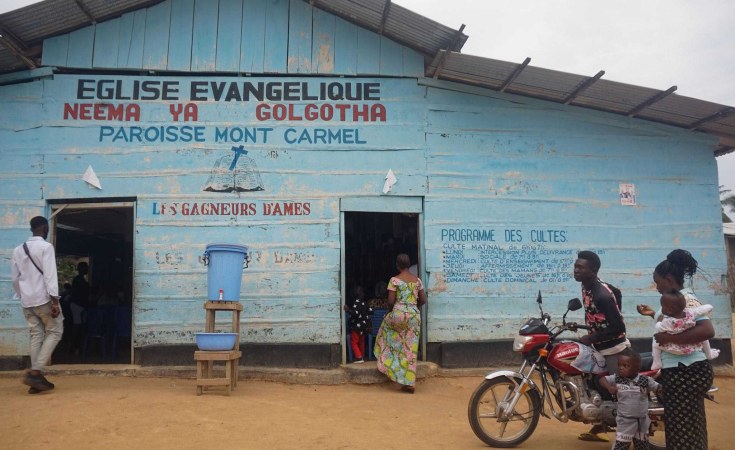Ceasefires and security objectives are understandably the priority, but assisting refugees is central to achieving peace.
The Democratic Republic of the Congo (DRC) has struggled with a multifaceted humanitarian crisis since the 1990s. The situation worsened in the past two years as the number and magnitude of conflicts escalated, especially in the east. Millions have fled their homes, creating a significant demand for humanitarian assistance.
The DRC has Africa's largest internally displaced population - 5.7 million as of 22 February. The United Nations Office for the Coordination of Humanitarian Affairs says over 10 million people desperately need aid.
In the eastern province of North Kivu, more than 12 attacks were launched by the M23 rebel group against the Armed Forces of the DRC (FARDC) since November 2021. M23 had been inactive for nine years, with a few sporadic incidents, but its resurgence now threatens the FARDC and local communities.
Peace initiatives recently brokered have produced few concrete results. M23's attacks will probably continue, exerting financial and political pressure on the DRC government before December's presidential elections. None of this bodes well for resolving the humanitarian crisis.
A 2021 Norwegian Refugee Council report found that displacement in the DRC was the world's most neglected crisis of its kind due to insufficient funding, limited media coverage, and few international diplomatic initiatives. In 2021 and 2022, the DRC's refugee situation ranked first among similar African crises. Despite its severity, the problem has been overshadowed by other disasters around the world, making it difficult to secure resources and attention.
Security force interventions often result in increased violence, displacement and human rights abuses
Although the East African Community, the International Conference on the Great Lakes Region and the United Nations (through its MONUSCO peacekeeping force) have tried to address the situation, progress has been slow. These initiatives have relied on militarised approaches at the expense of political solutions and humanitarian support.
The short-term successes achieved by security force operations have had adverse consequences. Experts believe focusing on military interventions closes the door to political solutions and undermines perceptions of the UN's impartiality. It has also increased the risk to civilians and diverted resources from non-military activities. The approach has failed to address the conflict's underlying drivers or the humanitarian crisis.
The consequences are particularly acute in conflict zones where civilians are most vulnerable. Security force interventions often result in increased violence, displacement and human rights abuses.
The political, social and economic factors that drive conflict need attention, with greater emphasis on humanitarian and diplomatic initiatives. Regional peace efforts should focus on sustainable strategies that prioritise civilians' protection and long-term stability.
In addition to safeguarding civilians, MONUSCO oversees all UN and foreign humanitarian operations in the area. But attacks by violent armed groups on UN personnel and vehicles hamper this, and access to affected areas and populations is restricted. The local population is also hostile towards some humanitarian organisations.
Regional peace efforts should prioritise civilians' protection and long-term stability
The DRC government's 2021-23 action plan includes pursuing national unity and respect for human rights. It commits to implementing development programmes to reduce poverty and promoting political inclusiveness and peacebuilding.
But in the east, the country continues to experience high levels of human rights violations and abuses, and violations of international humanitarian law - committed by all parties to the conflict. Intercommunal violence fuelled by hate speech through social media exacerbates the problem and stifles humanitarian initiatives.
The issue of internally displaced persons (IDPs) was on the African Union's February summit agenda. Leaders were concerned about the obstruction of humanitarian access and the urgent need to address the refugee crisis in eastern DRC. The 17 February East African Community mini summit and the Luanda and Nairobi peace processes also discussed the situation, mentioning the voluntary return of IDPs and refugees to their homes.
However, the lack of a lasting ceasefire and security guarantees impedes any kind of safe return. Diplomatic resolutions have not worked, and as the situation on the ground remains volatile, the humanitarian crisis worsens.
So far, peace initiatives have been ineffective because they lack mechanisms for monitoring, reporting, resolving disputes and enforcing accountability for violations. While hard security objectives will continue to receive priority attention, the refugee problem is central to sustainable solutions and must be addressed.
The East African Community force should focus on areas with the highest number of IDPs
A long-term solution that ensures the safety of IDPs and refugees requires sustained political and diplomatic efforts. The DRC government must prioritise the delivery of aid and safeguard humanitarian workers. Humanitarian access and coordination must also be improved.
The East African Community force should be fully activated. It should focus on removing armed groups from areas with the highest number of IDPs to facilitate humanitarian access. The force must also prioritise the security of humanitarian convoys to enable the safe delivery of aid.
Although MONUSCO has a role in coordinating humanitarian action, local aid organisations must be involved. They have the resources to improve access in areas where populations are hostile to UN agencies and can help develop context-specific solutions.
Giving humanitarian aid adequate attention and resources as part of regional peace initiatives is vital to building peace in the DRC.
Margaret Monyani, Senior Researcher, Migration and Remadji Hoinathy, Senior Researcher, Central Africa and the Great Lakes Region, ISS Pretoria


